- Specialist geochemical data analysis adds and refines all gold and base metal drill targets at Castle Minerals’ (CDT) Polelle project
- Five of eight prospecting licences that extends the project are now granted, with geochemical sampling extending in those areas
- Polelle is 15 kilometres south of the Great Boulder Resources (GBR) Side Well gold project and its 5.1 kilometres-long Mulga Bill intrusive related anomaly
- Adjoining Polelle to the north is the SensOre Tea Well project where SensOre proprietary technology has predicted a large mineral system
- Company shares are up 7.14 per cent to trade at 1.5 cents at 10:25 am AEDT
Castle Minerals Limited (CDT) has identified new and refined all gold and base metal targets at its Polelle project.
The project is in the eastern region of the Meekatharra gold mining centre of Western Australia, which the explorer and project incubator said was currently under-explored.
The company announced that a specialist geochemical data review and targeting study enabled it to refine the targets.
The study merged, “cleaned-up” and “levelled” the multi-element data suite from Castle’s own and historical auger and soil geochemical datasets.
The specific aim of the study was to better define orogenic gold and copper-zinc VMS-deposit style targets. The study then assessed and ranked each anomaly against a number of geological parameters including expected pathfinder element associations.
Ten high priority targets were highlighted with two adjacent targets classed as priority one, both of which are located in an area not previously prioritised.
The study noted that the association between gold and copper, arsenic, silver, bismuth and molybdenum is similar to other orogenic gold deposits in the region.
Castle Managing Director, Stephen Stone, was pleased to have found new and refined existing targets.
“The just completed specialist geochemical data review has refined and prioritised gold and base metal targets at the Polelle project in the under-explored eastern region of the Meekatharra gold mining district,” he said.
“Similar leading-edge targeting work by neighbours Great Boulder Resources and SensOre is also elevating the prospectivity of the region.
“Castle will shortly be extending its sampling coverage to incorporate eight new prospecting licences immediately to the north of Polelle, five of which are now granted.”
The company’s geological team is now reviewing the geochemical sampling targets and their ranking alongside the structural interpretation developed using recently flown, high-resolution aeromagnetic survey.
A field visit to check and validate the targets will be undertaken in coming days.
The 150 kilometre-squared Polelle project lies 25 kilometres south of Meekatharra and seven kilometres southeast of Westgold Resources’ operating Bluebird Mine. The newly granted prospecting licences extend Castle’s tenure north by four kilometres, to adjoin SensOre’s Tea Well project.
At the Side Well project of Great Boulder Resources (GBR) 15 kilometres to the north of Polelle, the Mulga Bill prospect has become a major focus and is associated with a 5.1-kilometre geochemical anomaly which has returned some very encouraging intercepts.
Company shares were up 7.14 per cent to trade at 1.5 cents at 10:25 am AEDT.

